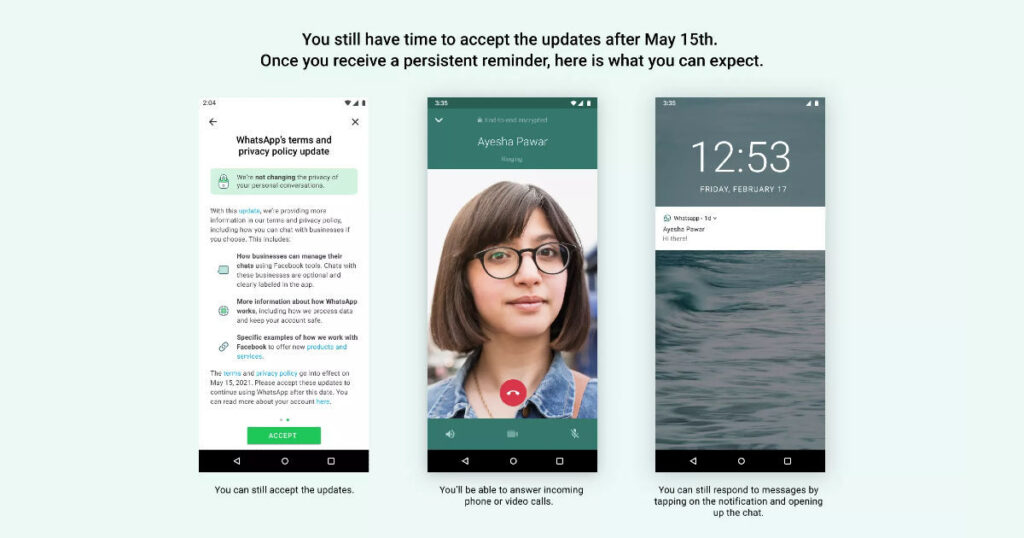Several rumors started circulating online after WhatsApp updated its privacy policy earlier this year, claiming that the company could read your private messages and share their contents with Facebook.
This was denied vehemently by WhatsApp, which claimed end-to-end encryption prevented both the company and Facebook from accessing your messages or hearing your calls. Even Telegram was attacked since it does not have end-to-end encryption. A new report, however, suggests that Facebook and WhatsApp are somehow able to view your private messages.
WhatsApp E2E report:
It was compiled by ProPublica, an independent investigative journalism organization that has a good track record. According to the article by 9to5Mac, both Facebook and WhatsApp can view your private messages. It states:
[An] assurance automatically appears on-screen before users send messages: “No one outside of this chat, not even WhatsApp, can read or listen to them.”
Those assurances are not true. WhatsApp has more than 1,000 contract workers filling floors of office buildings in Austin, Texas, Dublin and Singapore, where they examine millions of pieces of users’ content. Seated at computers in pods organized by work assignments, these hourly workers use special Facebook software to sift through streams of private messages, images and videos that have been reported by WhatsApp users as improper and then screened by the company’s artificial intelligence systems. These contractors pass judgment on whatever flashes on their screen — claims of everything from fraud or spam to child porn and potential terrorist plotting — typically in less than a minute.
It shouldn’t be possible for the said moderators to access your messages since WhatsApp claims to use end-to-end encryption. This is because end-to-end encryption should only allow recipients and senders to decrypt messages. This seems to not be the case.
Because WhatsApp’s content is encrypted, artificial intelligence systems can’t automatically scan all chats, images, and videos, as they do on Facebook and Instagram. Instead, WhatsApp reviewers gain access to private content when users hit the “report” button on the app, identifying a message as allegedly violating the platform’s terms of service. This forwards five messages — the allegedly offending one along with the four previous ones in the exchange, including any images or videos — to WhatsApp in unscrambled form, according to former WhatsApp engineers and moderators. Automated systems then feed these tickets into “reactive” queues for contract workers to assess.
A WhatsApp spokesperson responded to the report: “We build WhatsApp in a way that limits the data we collect while providing us tools to prevent spam, investigate threats, and ban those engaged in abuse. Providing the world with private communications requires extraordinary efforts from security experts and a valued trust and safety team that works tirelessly.” However, the spokesperson did say that based on feedback they have received from users, they are confident people understand what they are sending when reporting to WhatsApp.
Both Facebook and WhatsApp could be in serious trouble if the details mentioned in the ProPublica report are accurate. The 9to5Mac story speculates that there may have been misunderstandings in the investigation. The moderators reviewed Facebook messages and not WhatsApp messages. According to ProPublica, WhatsApp’s director of communications, Carl Woog, admitted there are contractors in Austin who review WhatsApp messages in order to identify and remove “the worst” abusers.” In addition, he told ProPublica, “We don’t call what we do content moderation on WhatsApp.”
In addition, the report cites a whistleblower complaint filed with the U.S. government last year. The Securities and Exchange Commission needs to solidify its claims. WhatsApp is accused of using external contractors, artificial intelligence systems, and account information. To”examine user messages, images, and videos,” according to the complaint. This complaint alleges that the company gives false assurances that users’ privacy will be protected.
According to the ProPublica report, WhatsApp moderators only have access to reported messages. If your messages are truly end-to-end encrypted, neither WhatsApp nor Facebook will be able to see what you’re writing.
Facebook Clarification for the end to end encryption policy:
WhatsApp moderators can read messages only if they are reported by users, according to a Facebook clarification. Privacy policies clearly outline the company’s behavior in this regard. Please accept our sincere apologies.
The company has also confirmed in a statement to 9to5Mac that when you use WhatsApp’s Report feature. It automatically sends the message to Facebook. Afterward, moderators can view the message as well as four preceding messages. In this way, moderators are provided with enough context to evaluate the offending post. The company is concerned, they can’t see other messages that haven’t been reported.







